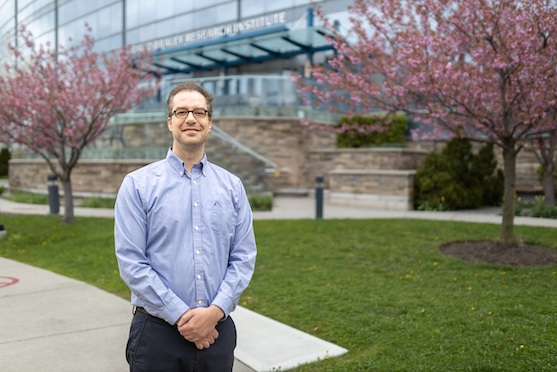Leading-edge research by Hamilton Health Sciences’ (HHS) Dr. Jason Roberts has the potential to revolutionize care for patients impacted by arrhythmogenic right ventricular cardiomyopathy (ARVC), a potentially fatal genetic condition affecting the heart’s muscle tissue.
As an HHS cardiac electrophysiologist, Roberts specializes in treating cardiac problems involving electrical activity and arrhythmia.
Roberts was one of four researchers honoured at the 2023 Hamilton Health Sciences Foundation Gala last month celebrating research and innovation at HHS. Each of the recipients –which also included Drs. Peter Gross, Guillaume Paré and Mark Tarnopolsky – received a $40,000 grant to take their innovative commercialization research projects to the next level.
Preventing sudden death
Arrhythmogenic right ventricular cardiomyopathy often presents itself in young adults in their late teens to early 20s. It can cause dangerously fast heartbeats that can result in fainting and even sudden death, especially in young athletes since exercise worsens the condition.
Currently, the standard treatment to prevent sudden death is to insert an implantable cardiac defibrillator into the heart, which can deliver shocks when these dangerously fast heartbeats occur. These shocks can be quite frequent and painful, plus they don’t prevent damage to muscle tissue caused by the disease.
As a result, people with ARVC must limit physical activity, which can cause other health issues, especially as they age. Through their research, Roberts and his team at the Population Health Research Institute of HHS and McMaster University, are working to find a more effective treatment option.
“For those who have one of the genes that cause ARVC, it doesn’t mean this condition has to develop,” says Roberts. “If there was a drug that could prevent the onset of ARVC, then patients may not need the implantable cardiac defibrillator.”
Promising clinical trial
Research involving Roberts’s team has found that a small molecule called tideglusib was successful at preventing dangerously fast heartbeats and heart muscle damage caused by ARVC in mice. This molecule has already been developed into a drug for another purpose. While it turned out not to be effective for that purpose, it was proven to be safe for human use and is now being tested for treating muscle disorders in people. Roberts saw the opportunity to try this drug for ARVC patients.
“ARVC affects muscle tissue in the heart, and this drug is already suspected to help with muscle disorders,” he says. “Since our team has found that the tideglusib molecule prevented ARVC in mice, it now makes sense to see if this drug can prevent ARVC in people.”
Thanks to funding from Hamilton Health Sciences Foundation and Canadian Institutes of Health Research, Roberts and his team are conducting a clinical trial with this drug.
Breaking the ‘Newfoundland curse’
The trial is set to begin later this year and will include 120 patients from 15 sites across Canada, including HHS. Since there are multiple genes that can cause ARVC, the trial will focus on individuals that have one of six possible genes, including one that has been labelled the “Newfoundland curse” – a gene discovered by researchers in Newfoundland that was responsible for the sudden death of seemingly healthy young adults within multiple generations of families.
“Targeted therapies that are able to directly address the abnormalities that arise from disease-causing genetic mutations are becoming more common in the medical field and, in many instances, have been shown to be dramatically effective,” says Roberts. “We’re hopeful that our clinical trial will show that our treatment works for all genetic subtypes of ARVC, including the Newfoundland curse.”


